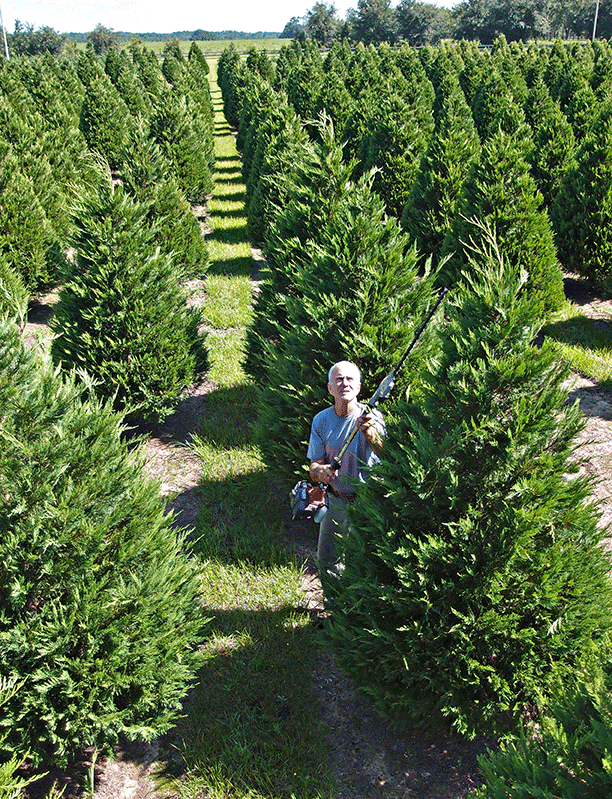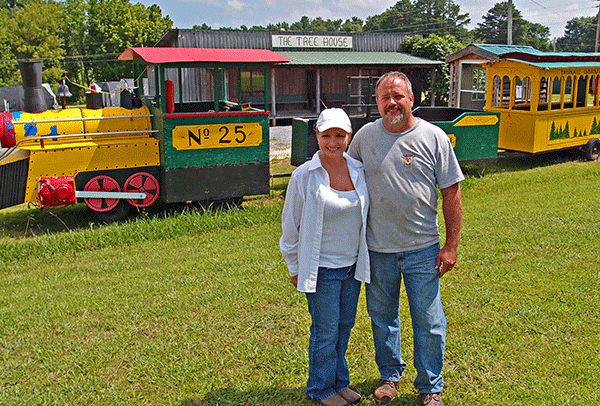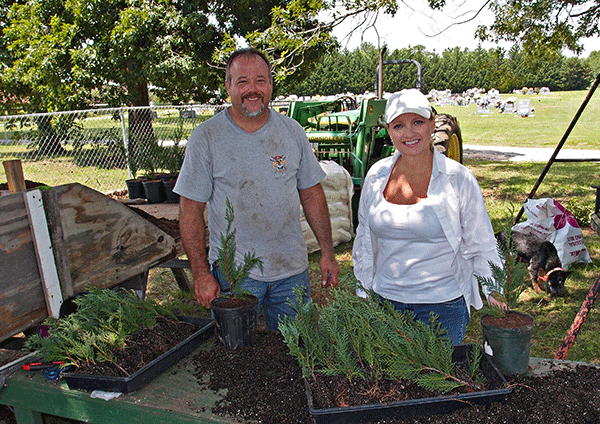
Story and photos by David Haynes
When our daughters were young, the Christmas season officially began for our family just after Thanksgiving when we’d load up and drive to a tree farm. We’d select a tree, cut it down, and bring it home to spend the rest of the afternoon and evening decorating it with family ornaments accumulated year after year, as well as new ones every year made by the girls from popsicle sticks or cotton balls.
Those trips to find a Christmas tree were a highlight of each holiday season. In fact, last year my older daughter took her 1-year-old son for his first trip to a tree farm. He loved it!
Until recently I hadn’t given much thought to what goes into making those experiences happen for families like ours. But after visiting some Alabama Christmas tree farms and talking with the owners, I came away with a new appreciation for the hard work and time that goes into providing that centerpiece holiday decoration for households across the state.
On the surface, it would seem to be an easy business endeavor, but it’s actually much like growing any other crop, requiring long days of hard work, careful planning and good luck with Mother Nature’s unpredictable whims.
Typically a Christmas tree farm opens for business around Thanksgiving. Families come to the farm, select a tree from among acres of trees growing in long rows, then either cut it or have the owners cut it for them and bring it home.
But by the time that perfect tree is ready for the living room it’s usually been tended, trimmed and watched over for three to five years by the tree farmer.
Leyland Cypress is the most popular variety

The growers I spoke with all said the Leyland Cypress tree was their most popular variety. These begin as seedlings that first must be transplanted into pots to grow under controlled conditions until they’re big enough to put into the ground. Once planted, the still fragile trees must be protected from wind, insects, disease and competing weeds, which means application of fertilizers, fungicides and herbicides, along with regular mowing throughout the year. As they mature, each tree must be trimmed two or three times each year to produce that classic O Tannenbaum shape.
Additionally, growers must plan carefully for their short retail season, which lasts only about one month between Thanksgiving through Christmas. This usually means hiring additional employees and making certain they’re trained, arranging for vendors who provide food, drink or other amenities, setting up electronic point-of-purchase equipment, making sure the equipment needed to bundle and tie down the trees is ready. Some farms have train or wagon rides, wreath and ornament shops, Santa Claus and other holiday-themed entertainment activities, all of which is aimed at making the experience of visiting their farm a memorable one for families, especially the children.
At Fish River Christmas Tree Farm in Summerdale Steve Mannhard uses a motorized hedge-type trimmer to shape Cypress trees on a 20-acre plot. He also sprays and cuts grass between the rows for weed control. “There’s always something that needs doing,” he told me.
Steve was still teaching school when he started the tree farm on his 40 acres back in 1981, but within a few years he left the teaching profession after he realized the farm was a full-time job in itself.

Each year he averages selling about 5,000 trees. The Fish River farm, which is close enough to the Gulf of Mexico to smell brine in the air, has five main offerings: the traditional model of the customer selecting and cutting a tree; living trees that are removed from the ground in a pot and can be later replanted after the holidays; hand-made wreaths and garland; a nursery operation that’s open year-round; and “Agri-tainment,” which he described at holiday-themed entertainment such as having Santa Claus on hand, a petting zoo, train rides and concessions.
He also imports Frasier Fir trees, which do not grow in the South. Other varieties include Virginia Pine, Murray Cypress, Carolina Sapphire, Eastern Red Cedar and Green Giant Arborvitae.
His Leyland Cypress are ready to sell in just three years whereas it takes up to four in North Alabama for the same tree. However, he said this is offset by the fact that he has more issues with disease and insects.
And then there are the hurricanes. Steve told me Hurricane Ivan blew over about 20,000 trees in the sandy soil, each of which had to be staked and straightened by hand, a job that took a month of long days plus 10 additional employees for the job who were not in his budget.
Flocked trees are new offering
Nearly 400 miles to the north, in the tiny Jackson County community of Rosalie, perched astride one the highest points on Sand Mountain at an elevation of about 1,500 feet, Thornhill Farm has been growing and selling Christmas trees since the 1970s. Started by Webb Gay and Joy Thornhill, it was one of the early “select and cut” tree farms in the state. Mr. Thornhill passed away earlier this year and Joy told me that her daughter and son-in-law, Cheri and Skyler Ramage, are taking over the day-to-day operation of the tree farm this year.
Cheri said the farm averages selling between 2,000 and 3,000 trees each year, most of which are the Leyland Cypress. They offer several other varieties, including living trees that can be replanted and imported fir trees. In the on-site “Tree House” shop they also have wreaths, ornaments and other Christmas-themed items.
Thornhill Farm offers complimentary hot cider, coffee and hot chocolate. On weekends during the holiday season, they also offer free rides on a train built by Mr. Thornhill many years ago.
This year they plan to offer a flocked tree set-up service, in which they bring a flocked, lit and decorated tree to the client’s home and set it up for them, then remove the tree and trimmings after the holidays.
“Most of our business is from repeat customers,” she said, adding that some families are now in their third generation of coming to the Thornhill Farm. “Some of them bring a picnic lunch and just make a day of it.”
The Back Home Tree Farm in Cottondale, located in the far southeast corner of the state south of Dothan, was the smallest of the farms I contacted. Owners David and Mary offer similar cypress and pine tree types. Mary told me they are also fortunate to have a supplier who brings fresh imported fir trees at several times during the holiday season.
“We sell between 200 and 300 trees each year,” she said. They have a “manageable” 20 acres planted in five plots, each of which is replanted on a five-year rotation. As one year’s trees mature and are harvested, that plot is replanted to begin the cycle again, she explained.
They started their Christmas tree farm 16 years ago, but she noted that it took several years before they had trees ready to be cut and sold. Their customers come mostly from South Alabama and Georgia and the Florida Panhandle and their lower volume allows them to remain an all-family business with Mary, David, their son, Corey, and daughter-in-law, Leanna, working the farm without having to hire seasonal part-time employees.
But she emphasized that their tree farm is still a full-time job that is labor intensive, “It’s just like a farm growing any other crop… it has to be tended year-round.”
The Southern Christmas Tree Association lists 11 tree farms in Alabama (http://www.southernchristmastrees.org/AL-Farms.html), but there are a number of other tree farms as well who aren’t members of the group.




